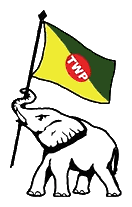
Back True Whig Party German Partido Whig Auténtico Spanish True Whig Party French True Whig Party ID ホイッグ党 (リベリア) Japanese 트루 휘그당 Korean True Whig Party Dutch Prawdziwa Partia Wigów Polish Partido True Whig Portuguese Партия истинных вигов Russian
This article needs to be updated. (December 2019) |
True Whig Party Liberian Whig Party | |
|---|---|
 | |
| Abbreviation | TWP |
| Leader | Reginald Goodridge |
| Historic leaders | Edward James Roye Anthony W. Gardiner William Tubman William Tolbert Clarence Lorenzo Simpson |
| Founded | 1869 (first incarnation) |
| Dissolved | April 1980 (first incarnation) |
| Preceded by | Opposition Party |
| Merged into | Coalition for the Transformation of Liberia |
| Headquarters | Monrovia, Montserrado County, Liberia |
| Ideology | Black conservatism[1] Centralization Protectionism Whiggism (until 1940s) |
| Political position | Right-wing |
| Colors | Green Yellow |
| Historical ethnic affiliation | Americo-Liberians |
| Seats in the Senate | 0 / 30
|
| Seats in the House | 0 / 73
|
| Party flag | |
 | |
The True Whig Party (TWP), also known as the Liberian Whig Party (LWP), is the oldest political party in Liberia and Africa as a whole. Founded in 1869 by primarily darker-skinned Americo-Liberians in rural areas, its historic rival was the Republican Party. Following the decline of the latter, it dominated Liberian politics from 1878 until 1980. The nation was virtually governed as a one-party state under the TWP, although opposition parties were never outlawed.[2][3]
Initially, its ideology was strongly influenced by that of the United States Whig Party (from which it took its name). The elephant mascot was taken from the Republican Party, the successor of the Whigs.[4][5] Much of the TWP's support came from the Americo-Liberian community who held an influential position over Liberian politics and society. The TWP's long term leader and President William Tubman was widely regarded as the father of modern Liberia.
The TWP fell out of power following the 1980 Liberian coup d'état in which many of its leading members died or fled, ending its dominant position. The TWP ceased to be officially recognized following the coup, although it was never disbanded and continued as a rump party. The party went on to participate in the unsuccessful Coalition for the Transformation of Liberia (COTOL) ahead of the 2005 general election before de-coalition and winning fewer votes at the 2017 elections. In 2020 it became part of the Rainbow Alliance (RA).
- ^ Carl Patrick Burrowes (2004). Power and Press Freedom in Liberia, 1830-1970. Africa World Press. p. 312.
- ^ "Liberia Country Study: The True Whig Ascendancy" Global Security
- ^ Kilson, Martin L. (1963). "Authoritarian and Single-Party Tendencies in African Politics". World Politics. 15 (2): 262–294. doi:10.2307/2009376. ISSN 1086-3338. JSTOR 2009376. S2CID 154624186.
- ^ Foreign Areas Studies Division (1964). Area Handbook for Liberia. p. 203.
- ^ "The True Whig Ascendancy". GlobalSecurity.org.